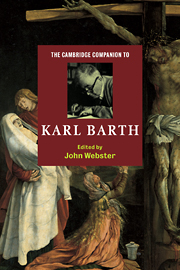Book contents
- Frontmatter
- 1 Introducing Barth
- 2 Theology
- 3 Revelation
- 4 The Bible
- 5 The Trinity
- 6 Grace and being
- 7 Creation and providence
- 8 Karl Barth’s Christology
- 9 Salvation
- 10 The humanity of the human person in Karl Barth’s anthropology
- 11 The mediator of communion
- 12 Christian community, baptism, and Lord’s Supper
- 13 Barth’s trinitarian ethic
- 14 Karl Barth and politics
- 15 Religion and the religions
- 16 Barth and feminism
- 17 Barth, modernity, and postmodernity
- 18 Karl Barth
- Index
15 - Religion and the religions
Published online by Cambridge University Press: 28 May 2006
- Frontmatter
- 1 Introducing Barth
- 2 Theology
- 3 Revelation
- 4 The Bible
- 5 The Trinity
- 6 Grace and being
- 7 Creation and providence
- 8 Karl Barth’s Christology
- 9 Salvation
- 10 The humanity of the human person in Karl Barth’s anthropology
- 11 The mediator of communion
- 12 Christian community, baptism, and Lord’s Supper
- 13 Barth’s trinitarian ethic
- 14 Karl Barth and politics
- 15 Religion and the religions
- 16 Barth and feminism
- 17 Barth, modernity, and postmodernity
- 18 Karl Barth
- Index
Summary
Christian theology of religions is an area within systematic theology that has lately undergone considerable development. The area has taken on greater definition in recent years as Christian communities throughout the world come to grips with a heightened awareness of other religious traditions, and with a growing desire on the part of Christians to pursue interreligious dialogue and other forms of positive engagement with Jews, Muslims, Hindus, Buddhists, and others.
Theologians practising this sub-speciality commonly address such questions as these: Are any of the teachings of other religious traditions true? How should judgments about this issue proceed? Do other religions point their adherents in the right direction? Can Jews, Muslims, Hindus, and Buddhists be saved? Can they be saved by following the teachings of their religions? How should Christians relate to Jews, Muslims, Hindus, Buddhists, and others? Should they attempt to persuade non-Christians to become Christians? Should they engage in dialogue with the adherents of other religions? What purposes does such interreligious dialogue serve? Drawing upon a long and substantial tradition of inquiry about these issues within Christian doctrine and theology, the agenda of the theology of religions has taken on an increasingly systematic shape as more and more theologians within the Christian churches turn their attention to these questions.
- Type
- Chapter
- Information
- The Cambridge Companion to Karl Barth , pp. 243 - 257Publisher: Cambridge University PressPrint publication year: 2000
- 5
- Cited by

